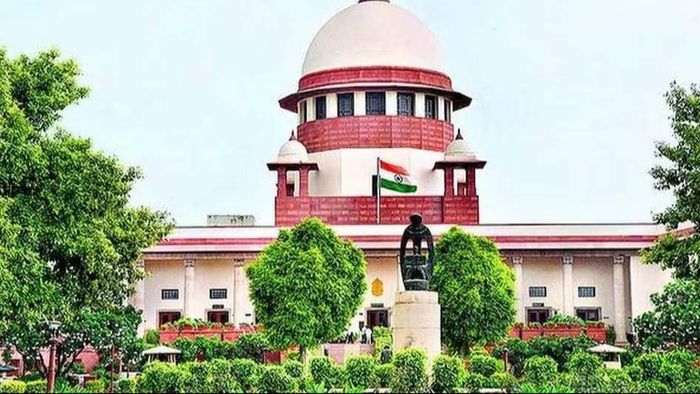Assam Sanmilit Mahasangh challenges 1971 base year for citizenship in Assam at Supreme Court
The Assam Sanmilit Mahasangh, the main petitioner at Supreme Court challenging the constitutional validity of Section 6A of the Citizenship Act, today said that fixing 1971 as base year for citizenship in Assam challenges the constitution of India.

- Dec 05, 2023,
- Updated Dec 05, 2023, 5:31 PM IST
The Assam Sanmilit Mahasangh, the main petitioner at Supreme Court challenging the constitutional validity of Section 6A of the Citizenship Act, today said that fixing 1971 as base year for citizenship in Assam challenges the constitution of India.
The statement was made by the counsel of the Assam Sanmilit Mahasangh, Shyam Diwan, during the hearing of the petition challenging the constitutional validity of Section 6A of the Citizenship Act, 1955, before a constitutional bench comprising five judges, led by Chief Justice of India D.Y. Chandrachud.
The bench also included Justices Surya Kant, M.M. Sundresh, J.B. Pardiwala, and Manoj Misra. Section 6A, a unique provision added to the 1955 Act, was enacted as part of the 'Assam Accord' signed on August 15, 1985.
The hearing which began today morning saw the counsel of the main petitioner the Assam Sanmilit Mahasangh put forth their over 3000 page submission in front of the apex court. The petitioner, while defending their demand for cut off date for the year 1951, have stated during their submission that the fixing of the year 1971 as the cut off date for Assam basically challenges the Constitution of India. The petitioner Assam Sanmilit Mahasangh has demanded that just as 1951 is the base year for citizenship in the rest of the country, the same parameter should be applied in Assam as well and not the year 1971 as had been agreed in the Assam Accord.
Issues regarding the history and demography of Assam were also presented during the submission of the petitioner Assam Sanmilit Mahasangh, which took up most of the hearing today.
The hearing of the apex court in this matter is going on the basis of one petition which has been compiled out of about a hundred petitions that had been filed in this matter.
The continuous hearing of the Supreme Court on this matter will carry forward tomorrow as well. Today's hearing was mostly taken up by the counsel of the Assam Sanmilit Mahasangh who put forth his submission before the apex court.
The Assam Sanmilit Mahasangh and several other organisations, acting as petitioners, are pushing for the cut off date base year for citizenship be made to 1951 for Assam as the rest of the country. On the other hand, there are other parties which are pushing for the cut off date base year to remain as 1971, such as the Asom Gana Parishad, All Assam Students Union, AAMSU, AIUDF, and others.
Apart from the various petitioners, Assam government's advocate general Devajit Saikia was also present at the apex court as part of the hearing.
The Assam Sanmilita Mahasangha, a Guwahati-based civil society organisation, filed a petition in November 2012 challenging Section 6A saying that it discriminates against other Indian citizens by permitting different cut-off dates for regularising illegal migrants entering Assam and the rest of the country.
It further sought the apex court’s intervention to ensure the updation of the National Register for Citizens (NRC) of Assam by taking into account the details available following the 1951 National Census instead of the electoral rolls before March 24, 1971, which is the cut off date for Assam.
In December 2014, the Supreme Court framed 13 questions covering various issues raised against the constitutionality of Section 6A. Here the court specifically questioned whether the provision dilutes the political rights of the citizens of Assam. The apex court further questioned whether Section 6A is a violation of the rights of the Assamese people to conserve their cultural rights. The Supreme Court further questioned if an influx of illegal migrants in India constitutes ‘external aggression’ and ‘internal disturbance’, among others.
A three-judge Bench of the apex court referred the case to a Constitution Bench in 2015.
Noteworthy here is that Section 6A is a special provision inserted into the 1955 Act in furtherance of a Memorandum of Settlement called the ‘Assam Accord’ signed on August 15, 1985, by the then Rajiv Gandhi Government with the leaders of the Assam Movement to preserve and protect the Assamese culture, heritage, linguistic and social identity.
This accord, signed by the Rajiv Gandhi Government and the Assam Movement leaders, aimed to preserve Assamese culture, heritage, and social identity.
The provision came after a six-year agitation by the All Assam Students Union (AASU) to identify and deport illegal immigrants, primarily from neighbouring Bangladesh. According to Section 6A, foreigners who resided in Assam before January 1, 1966, would have the same rights and obligations as Indian citizens.
However, those who entered the state between January 1, 1966, and March 25, 1971, would have the same rights and obligations, barring the right to vote for 10 years.
Section 6 A also in all essence establishes March 24, 1971, as the cut-off date for entry into the state, which basically means that anyone entering Assam later would be branded as an “illegal immigrant”.